Stephen Roney's Blog, page 245
April 10, 2020
Good Friday and Denial
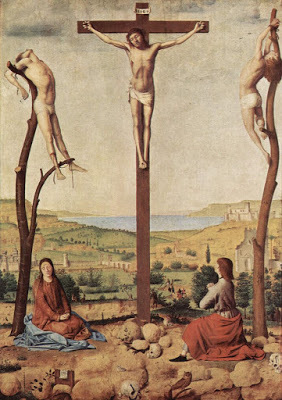
My friend Xerxes, for Maundy Thursday, quotes Jesus at the Last Supper: first he took a piece of pita bread, and divided it, saying:
“This bread is (like) my body (which will be) broken for your sakes.”
Then he raised the cup and said:
“This is like blood. You need it to keep your strength up. Drink it, and remember me in tough times.”
It seems to me this is worth citing as an example of denial, and of the perennial human tendency to deny evidence they do not want to accept.
The actual words, from 1 Corinthians, the earliest of the five texts we have confirming what he actually said, are of course quite different:
“This is my body that is for you. Do this in remembrance of me.”
“This cup is the new covenant in my blood. Do this, as often as you drink it, in remembrance of me.”
(NRSV)
Why the tendency to change the words? Because they are shocking. They suggest not only death, and a solemn pact hinting at requiring death, but cannibalism. This is above and beyond the thought that bread can become flesh and wine can become blood. That too may sound surprising, but then, not really, given the essential premise that the speaker is God himself.
Yet this is exactly why we can be assured they have been recorded correctly just as they stand in the gospels. Because they would be a very hard sell to anyone reading, as they stand. If this were not obvious enough, from Xerxes’s reaction, just such a reaction is presented in detail in John 6.
“I am the living bread that came down from heaven. Whoever eats of this bread will live forever; and the bread that I will give for the life of the world is my flesh.”
The Jews then disputed among themselves, saying, “How can this man give us his flesh to eat?” So Jesus said to them, “Very truly, I tell you, unless you eat the flesh of the Son of Man and drink his blood, you have no life in you. Those who eat my flesh and drink my blood have eternal life, and I will raise them up on the last day; for my flesh is true food and my blood is true drink. Those who eat my flesh and drink my blood abide in me, and I in them. Just as the living Father sent me, and I live because of the Father, so whoever eats me will live because of me. This is the bread that came down from heaven, not like that which your ancestors ate, and they died. But the one who eats this bread will live forever.” He said these things while he was teaching in the synagogue at Capernaum.
When many of his disciples heard it, they said, “This teaching is difficult; who can accept it?”
… Because of this many of his disciples turned back and no longer went about with him. (NRSV)
There is no ambiguity here; the apostolic record ensures there is no ambiguity.
Yet Xerxes is far from the only one who wants to resist and deny the plain meaning of Jesus’s words. Not because he, being God, could not have turned wine into blood, as he turned water into wine. Because it makes too graphic and real the significance of the sacrifice he made today, on Good Friday, over two thousand years ago. And what a solemn, serious commitment it really is to be a Christian.
'Od's Blog: Catholic and Clear Grit comments on the passing parade.
Published on April 10, 2020 14:24
The Dog That Has Not Barked

Why have we not heard results from any of the US studies of hydroxychloraquine yet?
The claim was that it can clear up symptoms from COVID-19 within five days. We have had lots more than five days since the US studies were announced. If the authorities have not managed to complete several tests, they are badly failing in their duty.
We should, logically, have heard either that it does or does not work by now.
There seem to be two possibilities: either it does not work, and the authorities do not want to say so, because the result might be despair in the general public; or it does work, but the authorities do not want to say so, because they do not have sufficient supplies.
At last evening’s presser, Trump asserted several times that more testing for antigens or antibodies, although desirable, was not needed in order to open the economy back up. This was striking; I had just written how this was indeed the key. Mike Pence kept speaking of “therapies,” or “medicines,” as the solution.
It seems to me he has to mean chloraquine et al. While there might be other promising drugs, almost anything else is going to take longer than the strategy of testing everyone.
It felt odd that he kept self-consciously using the vague term “therapies” (or was it “treatments”?) Then he clarified “medicines.” It was as though he was studiously avoiding the term “hydroxychloraquine.” Which might have started a run on the drug.
They presumably need somehow to shore up supplies. They seem to have shaken loose a large shipment from India. They may need to do more. Perhaps the shortage is not hydroxychloroquine, but zinc and azithromycin, which seem also to be parts of the suggested cure.
But whatever they plan to do, apparently, it will be faster than making enough test kits. Perhaps by May.
The case of Boris Johnson is troubling. Surely, as the PM, his British doctors would have had access to the drug. And he seems to have had a rough go.
But it would not be too surprising if, out of machismo and general lack of concern for his own health, he declined such treatment early on, figuring he could tough it out like the next guy. One gets the sense that he, and the British establishment, have not been inclined to take coronavirus that seriously.
'Od's Blog: Catholic and Clear Grit comments on the passing parade.
Published on April 10, 2020 12:01
April 9, 2020
Thinking it Through
We need some clarity here. We seem to have a tiger by the tail. We are keeping virus deaths down by isolating, but this cannot continue, or people are going to starve. Yet if we open up again, aren’t we only back where we started?
I had been hoping for a miracle cure. I had been hoping that hydroxychloroquine, perhaps in combination with zinc and azithromycin, might reliably treat COVID-19, making it no worse than the flu. That might still be so. The chief problem may still be a lack of supply. But each day that goes by without this being announced, or clearly showing up in the raw numbers of people dying or admitted to intensive care, makes it seem less likely. We are seeing numbers ease, but not dramatically fall.
Another effective treatment might also be discovered. Then the time we have bought would make sense.
But what if none of this happens within the next few weeks?
The solution seems to be to test everyone, and then continue to test aggressively. If we know reliably who has the illness, we can quarantine just them, and everybody else can go back to work.
'Od's Blog: Catholic and Clear Grit comments on the passing parade.
Published on April 09, 2020 06:27
Pope Francis Comments on Coronavirus
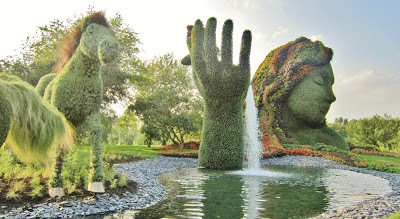 "Mother Nature" topiary, Montreal.Pope Francis has been quoted by UK Catholic publication The Tablet as saying, regarding the current COVID-19 crisis,
"Mother Nature" topiary, Montreal.Pope Francis has been quoted by UK Catholic publication The Tablet as saying, regarding the current COVID-19 crisis,There is an expression in Spanish: “God always forgives, we forgive sometimes, but nature never forgives.” We did not respond to the partial catastrophes. Who now speaks of the fires in Australia, or remembers that 18 months ago a boat could cross the North Pole because the glaciers had all melted? Who speaks now of the floods? I don’t know if these are the revenge of nature, but they are certainly nature’s responses.
This is a disturbing comment coming from the head of the Catholic Church. It personifies “nature” and sees it as having free will and vast powers.
He also goes so far as to make the clear distinction between nature and God. Just so there can be no misunderstanding that he is merely using the one term to refer to the other.
This seems to confirm that his interest in and support of Pachamama some months ago was not innocent.
One suspects that the Spanish proverb he quotes is talking about nature figuratively, meaning natural laws: you cannot bargain with the law of gravity. If so, Francis misunderstands or misuses it. There is no science in drawing a causal link between COVID-19, the fires of Australia, and the (fictitious) melting of glaciers at the North Pole.
A monotheist might, indeed should, see in this present plague at least the passive will of God. Only a polytheist would see it as the independent action of some other spiritual being.
Put simply, the present pope is not Catholic.
'Od's Blog: Catholic and Clear Grit comments on the passing parade.
Published on April 09, 2020 05:48
April 8, 2020
Coronavirus and the Noble Savage
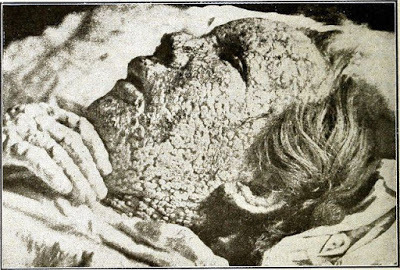 The face of smallpox.
The face of smallpox.An interesting and colourful visual about pandemics features an example of the Noble Savage myth that has messed up our relations with our indigenous people—and been so harmful to Canada’s “First Nations.”
“Disease and illnesses have plagued humanity since the earliest days, our mortal flaw. However, it was not until the marked shift to agrarian communities that the scale and spread of these diseases increased dramatically….
The more civilized humans became – with larger cities, more exotic trade routes, and increased contact with different populations of people, animals, and ecosystems – the more likely pandemics would occur.”
Anyone with a glancing knowledge of Canadian history should spot the problem. Was there ever a pandemic worse than the smallpox that wiped out the majority of our native people, soon after first contact? Some estimates put the rate of death at 90%.
That would surely make it the worst pandemic in history. And it happened to a non-agrarian people. Kind of killing this assertion of the superior health of hunter-gatherers.
If the most famous pandemics of history have occurred to agrarian societies, this is simply because hunter-gatherers tend to have no writing system, and so their epidemics are not recorded. They have no history. We know of the mass deaths from smallpox because they were observed by Europeans.
It is a fair point that, with greater trade and commerce, diseases can spread more easily. However, even today, sailors who venture far abroad for trade are a minority. For most folk, becoming agrarian means a more settled way of life, and less contact with others. Hunter-gatherers must range widely to acquire food. An Indian band might easily have ranged from the Rockies to Lake Superior within a year or two. Accordingly, more individuals come in contact with more and more distant people, and more distant ecosystems. They also come in close contact with a wider variety of animal species, as food, each of which might pass on some unknown virus species to species. Think bats and pangolins in Chinese wet markets. Think “bush meat,” the suggested source of Ebola in Africa.
Score one for civilization.
The “Noble Savage” myth wants us to believe that the native people of North America lived relatively disease free until smallpox, tuberculosis, and other awful diseases arrived with the Europeans, having been bred in the crowded cities of Europe. They think of the smallpox pandemic that killed so many Indians as a one-shot event, becauswe when first encountered the Indians, unlike the Europeans, had no immunity.
But this does not fit the historical record.
For centuries, wherever European explorers ventured in the New Word, they found the local populations devastated by some recent epidemic. When Cortez discovered Mexico, he found it depopulated by a recent plague. When De Soto travelled through the American southwest in the 16th century, he found it again depopulated by as recent plague. When Vancouver explored the Pacific Northwest in the 18th century, he found it again devastated by a recent plague. When Lewis and Clark crossed the Great Plains in the early 19th century, they found them devastated by a recent plague. Another great plague was recorded on the same Great Plains in the late 19th century.
This was not a question of one plague, devastating the native population all at once, caused by one contact. It was a series of plagues, occurring predictably about every two or three generations. None but the first could be blamed on first contact.
At the low population densities of hunter-gatherer societies, disease antibodies are unable to establish themselves in a population, producing herd immunities. As it turns out, the densely populated cities of Europe give a definite advantage here.
So it is not that the Indians encountered some new diseases from Europe to which they had no immunity. It is that any and all infectious diseases will have hit them every two or three generations, and each time they would have no immunity.
This was probably all going on every sixty years or so long before the first Europeans appeared.
After all, if Columbus’s visit set it all off, why didn’t the Vikings? We now know they were here five hundred years earlier.
There is even reason to believe that smallpox did not come to North America from Europe. Recent genetic sequencing at McMaster University suggests that, given rates of mutation, the modern smallpox virus could have emerged nowhere earlier than 1588 to 1645—both dates after Columbus. At that point, neither Europeans nor native Americans could have had any immunity.
Yet it became exponentially more deadly in America. First contact with an imported disease cannot explain that.
Tuberculosis, the second great pandemic among Native North Americans, has been found in South American cadavers from three thousand years ago.
It seems most probable that pandemics, with mass deaths, were a regular feature of aboriginal life long before first contact, and first contact did not change this. Something lethal to most of the population probably popped up every couple of generations. As tends to happen to wild animals: mass die-offs.
We do not know only because there is no record, before the Europeans came to note it down.
'Od's Blog: Catholic and Clear Grit comments on the passing parade.
Published on April 08, 2020 08:50
April 7, 2020
Cardinal Pell Exonerated.
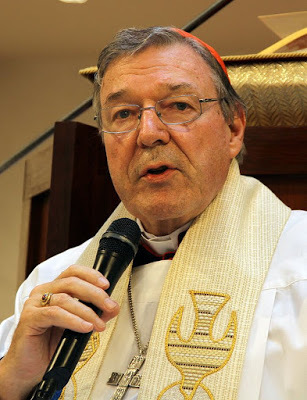
Good news that, given the current crisis, virtually nobody is going to notice:
Cardinal George Pell was just exonerated unanimously by the Australian High Court, on the charge of sexual abuse of minors. They say the evidence was not properly considered.
This means his immediate release.
He has been through hell.
'Od's Blog: Catholic and Clear Grit comments on the passing parade.
Published on April 07, 2020 08:45
No More Water, But the Fire Next Time
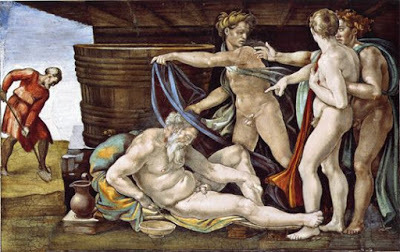
The notion of ancestral guilt seems central to the Bible. The story of Adam and Eve and the apple and original sin is not the only example. We also have the story of Noah and his sons.
According to a superficial reading of the tale in Genesis, Noah is the one righteous man on Earth. So God preserves him and his three sons, and their wives, in the ark, as the rest of the world dies. Kind of like the coronavirus.
When the flood abates, Noah emerges, plants vines, grows grapes, and makes wine. He gets blind drunk. While he is drunk, his son Ham comes into his tent and sees him naked. As a result, Noah curses him and all his descendants.
Noah began to be a farmer, and planted a vineyard. He drank of the wine and got drunk. He was uncovered within his tent. Ham, the father of Canaan, saw the nakedness of his father, and told his two brothers outside. Shem and Japheth took a garment, and laid it on both their shoulders, went in backwards, and covered the nakedness of their father. Their faces were backwards, and they didn’t see their father’s nakedness. Noah awoke from his wine, and knew what his youngest son had done to him. He said,
“Canaan is cursed. He will be a servant of servants to his brothers.”
But a superficial reading does not seem possible. Noah is the one righteous man on earth, and here he does not seem to be acting righteously. Is it clear Ham has done anything wrong? Doesn’t Noah bear more responsibility, for getting drunk? What is so terrible about seeing your father naked? And even if Ham looked deliberately, why should his children or grandchildren be punished for it?
The key, I suggest, is that “seeing a man’s nakedness” is a euphemism for having sex with his wife. The Bible uses this euphemism repeatedly elsewhere. Genesis itself says that man and wife are “one flesh.” See Leviticus 18: “‘You shall not uncover the nakedness of your father’s wife. It is your father’s nakedness.”
So what actually happened is that Noah and Mrs. Noah got blind drunk, and Ham took advantage of this to have sex with his mother.
Noah presumably indeed bears some responsibility for getting drunk. As the first to plant a vine, he might not have known wine’s effects. Nevertheless, to get so drunk, he must have overindulged. It would have been overindulgence of a natural appetite at this point even had it been non-alcoholic grape juice. He liked what was happening, and kept going. The sin is eerily similar to that of Eve in eating the apple because it “looked good to eat.”
The more serious sin of the son echoes again the subsequent sin of Cain against Abel. First you overindulge a natural appetite, which seems harmless. But over time, by the next generation, the habit of indulging appetites leads to more serious places, like rape, incest, and murder.
In our chosen translation, the World English Bible—chosen only for copyright reasons—Noah does not actually curse Ham. He only says he IS cursed. “Canaan is cursed.”
Some other translations make it an act of Noah’s will: King James says “Cursed be Canaan.” But both translations are obviously possible. Young’s literal translation has only “cursed Canaan.” No verb.
So we can legitimately read Noah as only making an observation. Ham has demonstrated moral depravity. Ham has shown no filial piety. He will presumably also show no regard for proper parenting in turn.
We have spoken before of the problem of idolizing parents and ancestors. Unreflective children naturally take their parents as the measure of all things. Noah foresees that Ham is going to pass that moral depravity on to his children, and children’s children, into the indefinite future, so long as individual descendants do not make a conscious and painful effort to exile from their families and seek truth and righteousness on their own. Noah foresees a family tradition of moral depravity.
This, in the minds of those who wrote the Bible, could explain the observed depravity of the contemporary Canaanites, Ham’s descendants, who notoriously practiced child sacrifice.
In this way, the sins of the fathers do visit the sons, unto the third or fourth generation.
Possibly a relevant thought in this time of coronavirus. Not to mention plagues of locusts, and unchecked wildfires in Australia and Thailand.
'Od's Blog: Catholic and Clear Grit comments on the passing parade.
Published on April 07, 2020 06:53
April 6, 2020
A Note from the Philippines
My sister-in-law reports from the Philippines that local governments are distributing “meal kits.” For a household of six adults and two children, she received 3 kilos of rice, 3 cans of sardines, 2 packages of instant ramyen noodles, 2 packages of instant udon noodles.
No word on whether more packs will come in the future.
'Od's Blog: Catholic and Clear Grit comments on the passing parade.
Published on April 06, 2020 06:38
Born with the Gift of Laughter, and a Conviction that the World Was Mad
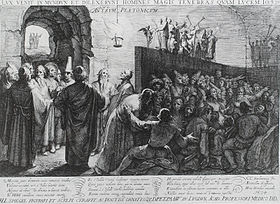 Plato's wine cave.
Plato's wine cave.Perhaps the most important insight religion has, one of the most important bits of wisdom life can offer, is that most people are insane.
Insane in the proper sense: they do not see reality.
Plato makes this argument in his analogy of the cave. But it is also asserted in Judaism, Christianity, Buddhism, Hinduism. Most people live lives of illusion. Few become enlightened. Few are saved.
It is not because people are stupid. And it is not because the universe is designed by some evil genius to be deceptive.
Because dogs are obviously sane, yet we do not think of dogs as terribly smart.
Insanity is a moral issue. Modern psychiatry and psychology will do everything it can to insist otherwise; but psychiatry and psychology are insane. All insanity is what they call denial. We really see the truth, but do not want to see it. We make believe otherwise. And so our heart, our soul, our consciousness, becomes split, warring against itself. And we begin on a downward spiral.
Dogs, on the other hand, are whole-hearted. There are no filters, no internal monologues.
And this is no doubt why Jesus said not just “love God,” but “love God with all thy heart, and with all thy soul, and with all thy mind.” To see truth, we must be whole-hearted, as dogs are whole-hearted, as children are whole-hearted.
Dogs, luckily for them, are not moral beings. They are incapable of sin, and so incapable of this schizophrenia.
When the Buddha, sitting under the Bo tree, was on the verge of enlightenment, he was attacked by all the legions of Mara, of illusion. They tempted him; they threatened him. And he stretched down his hand to touch the Earth, and called the Earth as witness to his true merit.
His enlightenment was not a matter of figuring things out; not an intellectual feat. It was an act of moral courage.
Where does that leave those people we currently call “insane”? The bipolars, the schizophrenics?
Perhaps not sane, yet, but less insane than the rest of us. They are at least conscious of the disconnect, and struggling with it. They are dealing with the legions of Mara.
I find it difficult to watch the daily pandemic briefings by Prime Minister Trudeau. Because no answer he gives is ever honest. You see he is not saying what he thinks. Truth is to be avoided at all costs, even when there seems to be no reason to avoid it. Everything must be said to be perfectly okay, no matter what the real situation.
Trump, in the US, I find more reassuring. Or Johnson, in the UK. They might lie now and then, but often you know they are saying what they think. They are at once more honest and more sane.
For it is the same thing.
'Od's Blog: Catholic and Clear Grit comments on the passing parade.
Published on April 06, 2020 05:53
A Journal of the Plague Year
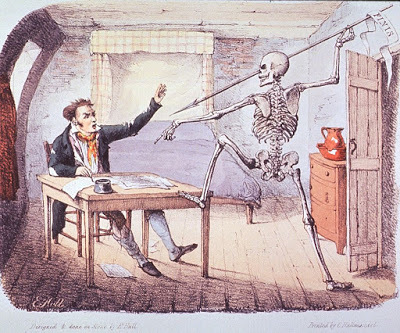
Trump is deploying the military to New York and other parts of the Northeast.
Justin Trudeau has just announced that he is calling up all reservists, on a voluntary basis. He presents this as a make-work project for the unemployed. But I doubt that’s what it’s about.
In either case, the real worry is that under the stress of the pandemic and the lockdown, social order will break down. People are going to get desperate for food. Police are going to be out sick, or calling in sick because they are afraid to go to work.
'Od's Blog: Catholic and Clear Grit comments on the passing parade.
Published on April 06, 2020 04:58



